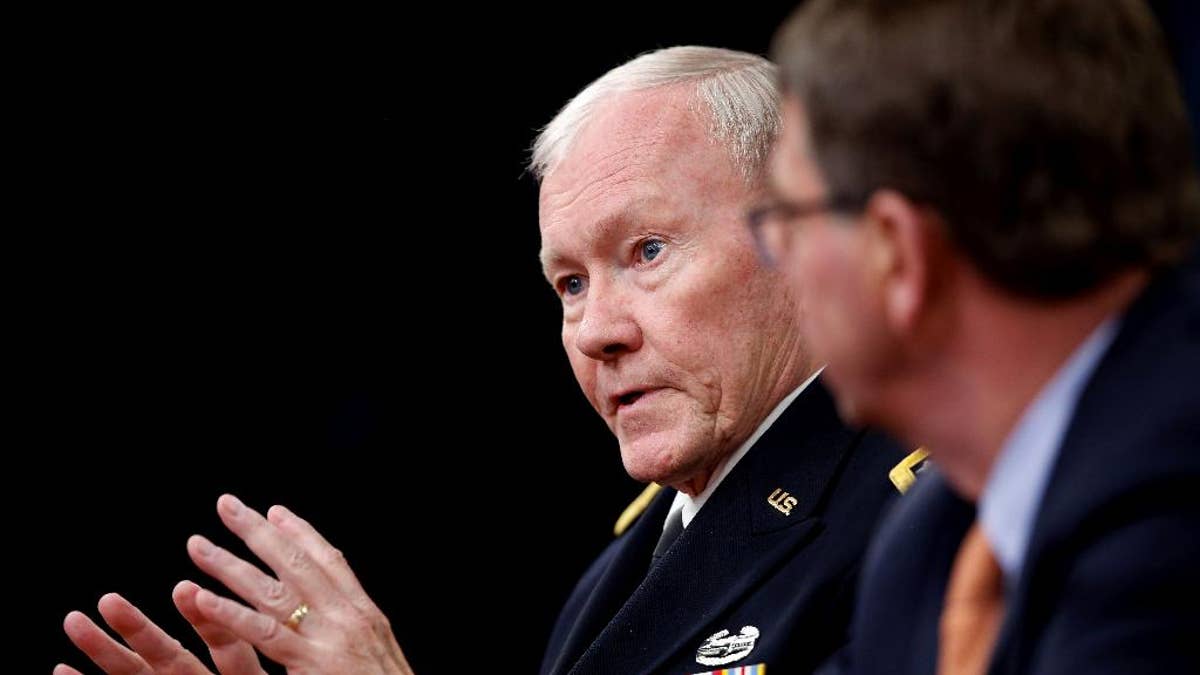
FILE - In this April 16, 2015 file photo, Joint Chiefs Chairman Gen. Martin Dempsey, left, accompanied by Defense Secretary Ash Carter, speaks during a news conference at the Pentagon. Dempsey says the new U.S. military hub could be a model for even more such training facilities – and more U.S. troops – to help the Iraqis reverse major battlefield losses to the Islamic State. (AP Photo/Andrew Harnik, File) (The Associated Press)
WASHINGTON – Amid persistent setbacks in the fight against the Islamic State, President Barack Obama turned his military's focus to the Sunni-Shiite divide, ordering hundreds of troops to Iraq to better integrate Iraqi forces and lay the groundwork to retake Ramadi and other key cities.
The expanded military campaign will set up a new base in Anbar Province to advise Iraqi forces on how to plan and organize operations and help them reach out to Sunni tribes and bring them into the battle.
But it leaves out any move to send U.S. forces closer to the front lines, either to call in airstrikes or advise smaller battlefront units, underscoring Obama's reluctance to plunge the military deeper into war and risk the sight of more body bags coming home from Iraq.
Under the plan announced Wednesday, up to 450 more American troops will deploy to Iraq in the next six to eight weeks and set up a fifth training site al-Taqaddum, a desert air base that was a U.S. military hub during the 2003-2011 war. The site will be dedicated to helping the Iraqi Army integrate Sunni tribes into the fight, an element seen as a crucial to driving the Islamic State out of the Sunni-majority areas of western Iraq.
The expanded effort also will include expediting the delivery of U.S. equipment and arms to Iraq, including directly to troops at al-Taqaddum, under the authority of the government in Baghdad.
The U.S. is insistent that the Americans will not have a combat role, but they may venture out of the base in order to help identify and recruit Sunni tribes. About a quarter of the new troops will be advisers, and the remainder will handle security, logistics and other administrative tasks.
Obama this week lamented that the U.S. lacks a "complete strategy" for defeating the Islamic State, and officials pointed to a glaring lack of recruits among Sunnis. The administration insisted Wednesday that the plan is not a change in the U.S. strategy, but instead said it addresses that Sunni recruitment failure.
The Sunni-Shiite divide has been at the heart of the Islamic State's successes in Iraq. Officials blamed the Iraqi government for last year's collapse of the military in the face of the Islamic State onslaught. Many Sunnis in the armed forces dropped their weapons and fled, unwilling to fight for the Shiite-led government.
Some local citizens in Sunni-majority areas still fear an invasion and reprisals from Iran-backed Shiite militia even more than domination by the Islamic State. And Iraqi leaders in the Shiite-led government have been slow to recruit Sunni tribesmen, fearing that the fighters, once armed, could turn against them.
New Iraqi Prime Minister Haider al-Abadi has promised to address those concerns.
Obama's new plan, however, doesn't go far enough for critics who have pressed for military coordinators and advisers closer to the front lines to augment the U.S. airstrike campaign.
House Speaker John Boehner, R-Ohio, said Wednesday that sending several hundred military advisers to Iraq "is a step in the right direction," but he criticized Obama for not having "an overarching strategy." Sen. John McCain of Arizona, the Republican chairman of the Armed Services Committee, was harsher in his assessment: "This is incremental-ism at its best or worst, depending on how you describe it."
And some Democrats were also concerned.
"Absent significant reform, we can help the Iraqi forces win battles, but they will not stay won," said Rep. Adam Schiff of California, the House Intelligence Committee's top Democrat.
There now are nearly 3,100 U.S. troops in Iraq involved in training, advising, security and other support. In addition to bombing missions, the U.S. is conducting aerial reconnaissance and intelligence-gathering missions against Islamic State forces, while counting on Iraqi troops to do the fighting on the ground.
In Syria, an American fighting with Kurdish forces against the Islamic State group became the first non-military American to be killed in battle against the militants, authorities said Wednesday.
Keith Broomfield of Massachusetts died June 3 near the border town of Kobani, said Nasser Haji, an official with a group of Kurdish fighters known as the YPG. He said Broomfield had joined the YPG on Feb. 24 under the nom de guerre Gelhat Raman. The State Department also confirmed Bloomfield's death.
As for the fresh U.S. military troops, Obama's decision amounts to an acknowledgment by the administration that it has not been swift enough to respond to Iraqi military limitations and Islamic State inroads.
"We have seen shortfalls in elements of Iraqi capacity," Deputy National Security Adviser Benjamin Rhodes said. "I think the Iraqi government itself recognizes that. Part of the question that we're trying to answer here is how do we have a better ability to move quicker when we see those shortfalls."
___
Associated Press writers Robert Burns, Deb Riechmann and Nedra Pickler contributed to this article.

